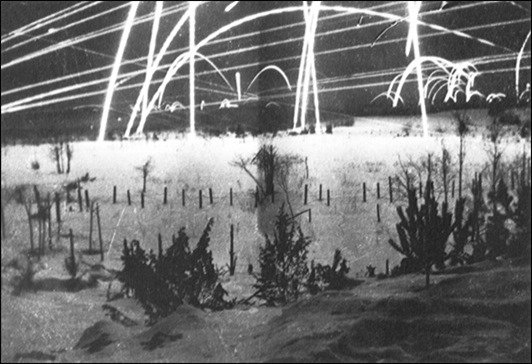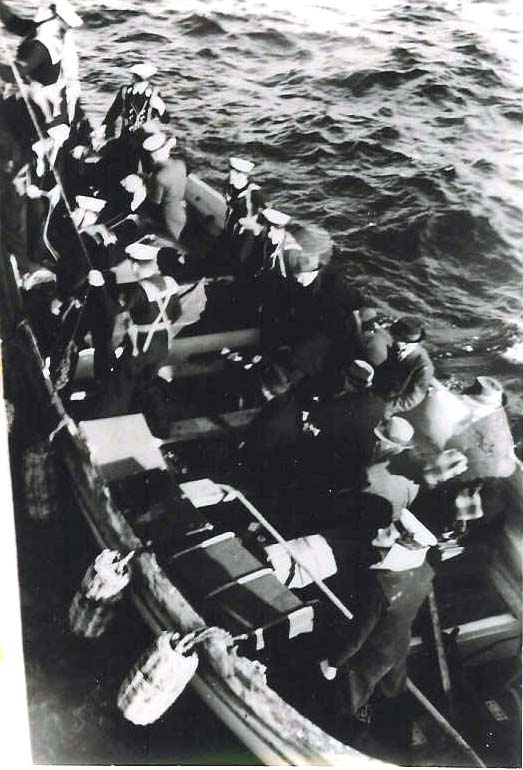Thursday 1 February 1940
 |
| Night artillery exchanges and air attacks at Summa, February 1940. |
The artillery barrage ramps up to 300,000 shells in 24 hours, more than has been fired at Summa since the start of the campaign. The 13th Army joins in, though the main effort is at the 7th Army. Together, the two Soviet armies have 14 divisions and six tank brigades, along with reserves filling the rest of the Karelian Isthmus.
Only regiment probing-style attacks are launched. The idea is to test the Finnish defenses, wear the Finns down and soften the defenses, not a breakthrough - yet.
New tank tactics also are tested. The tanks come in smaller numbers and with more infantry support, making them harder to destroy. A rarity in warfare up to this point, they also use tank flamethrowers. The Soviets escalate their artillery and air bombards, and attacks are screened with smoke. Unconcerned about losses, the Soviet Generals send their troops straight at the fortifications in dense masses in the distinctive attack known as à la russe.
The Finnish defense is complicated due to troop rotations they recently have made. The Finnish 2nd Battalion, 9th Infantry Regiment has been brought to the area of the attack. While capable troops, the 9th Infantry Regiment happens to be completely Swedish-speaking. This is not unusual in Finland - some 6% of all Finns speak Swedish - but it creates communications issues.
While the Mannerheim Line has been battered by weeks of artillery barrages, the ruins serve as effective firing positions. The Finns hold the line for the time being. This first day is just an appetizer.
Winter War Air Operations: Aside from supporting the attack at Summa, the Soviets bomb Rovaniemi and Kemi. The Finns have both aircraft now from several nations, including the Americans and the British. Swedish volunteers are flying off of a frozen lake at Kemi.
Battle of the Atlantic: US President Roosevelt writes to his friend, First Lord of the Admiralty, and informs him that the British policy of detaining US freighters was hurting Anglo/US relations. "The general feeling is," Roosevelt writes, "that the net benefit to your people and the French is hardly worth the definite annoyance caused to us."
U-13 (Max-Martin Schulte) torpedoes 2,491-ton Swedish freighter Fram at 13:43 while it is lying at anchor in Aberdour Bay, Scotland. There are 14 survivors, and 9 perish.
U-59 (Oberleutnant zur See Harald Jürst) torpedoes and sinks 498-ton British freighter Ellen M. 20 miles northeast of Lowestoft, England at 20:44. All 9 crew members perish.
The British at Gibraltar detain US freighter Exminster, and they release US freighter Exochorda.
Convoy OB 83 departs from Liverpool, SL 19 departs from Freetown and HG 17 departs from Gibraltar.
Balkan Relations: The foreign ministers of Yugoslavia, Turkey, Romania, and Greece meet Belgrade to discuss issues of mutual concern.
German Military: General Erich von Manstein, chief of staff to Army Group A, is transferred to command of German XXXVIII Korps. This is done by his superiors partly in an effort to get him away from the center of power, as his innovative ideas about Fall Gelb are not appreciated. However, Hitler has heard about them and is intrigued. The Generals' plan backfires when Hitler manages to meet with Manstein at a formal reception honoring his (and other Korps commanders') appointment, where the two chat about how to attack in the West.
British Military: General Claude Auchinleck takes command of IV Corps.
British Government: The Admiralty takes control of merchant shipbuilding and repair.
Japanese Government: The new government embarks upon a five-year rearmament program. It presents a record budget, with almost half devoted to the military.
The government also officially protests the British seizure of 21 German nationals from the Asama Maru Incident of 21 January 1940. It demands the return of the Germans.
British Homefront: The Lord Mayor's Red Cross and St. John's Fund passes the £1,000,000 level.
China: Communist leader Mao Tse-tung issues an appeal to the American Government to stand firm in its opposition to Japanese aggression.
In the dwindling Winter Offensive, the Chinese 2d War Area halts operations and withdraws from the Japanese-held city of Changtze.
At the Battle of South Kwangsi, the Japanese attack Pinyang.
The Imperial Japanese Air Force attacks Chinese airfields near Chinhua, Yushan, and Chushien.
Holocaust: Italy, which largely keeps its distance from the German holocaust agenda, enacts its own Employment laws imposing constraints upon Jews.
 |
| Mao Tse-Tung. |
February 1940
February 3, 1940: Soviets Capture a BunkerFebruary 4, 1940: Peace Talks in Stockholm
February 5, 1940: Allies to Invade Norway
February 6, 1940: Careless Talk Costs Lives
February 7, 1940: IRA Terrorists Executed
February 8, 1940: Spies!
February 9, 1940: The Welles Mission
February 10, 1940: Confiscation of Jewish Goods
February 11, 1940: Soviets Attack Mannerheim Line
February 12, 1940: Breaches In Mannerheim Line
February 13, 1940: Soviets Inching Forward in Finland
February 14, 1940: Soviets Batter Mannerheim Line
February 15, 1940: Finns Retreat
February 16, 1940: Altmark Incident
February 17, 1940: Manstein and Hitler Discuss Fall Gelb
February 18, 1940: Operation Nordmark
February 19, 1940: King Gustav Says No
February 20, 1940: Falkenhorst Commands Weserubung
February 21, 1940: Radar Advances
February 22, 1940: Friendly Fire
February 23, 1940: Soviets Present Their Demands
February 24, 1940: Fall Gelb Revised
February 25, 1940: Mr. Welles Comes to Visit
February 26, 1940: Battle of Honkaniemi
February 27, 1940: Finns Retreat Again
February 28, 1940: Overseas Volunteers Help Finland
February 29, 1940: Finns Accept Soviet Terms In Principle
2019





